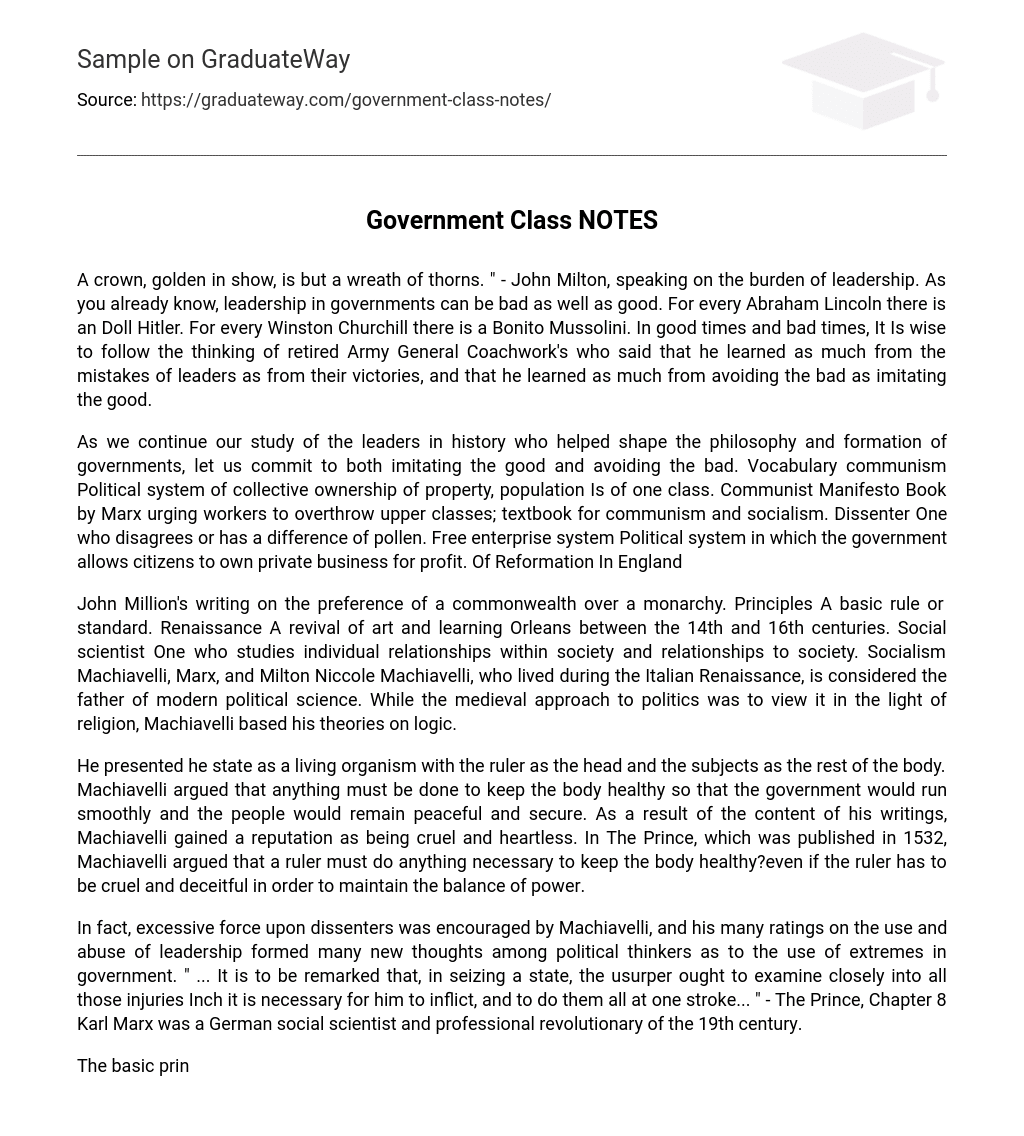A crown, golden in show, is but a wreath of thorns. ” – John Milton, speaking on the burden of leadership. As you already know, leadership in governments can be bad as well as good. For every Abraham Lincoln there is an Doll Hitler. For every Winston Churchill there is a Bonito Mussolini. In good times and bad times, It Is wise to follow the thinking of retired Army General Coachwork’s who said that he learned as much from the mistakes of leaders as from their victories, and that he learned as much from avoiding the bad as imitating the good.
As we continue our study of the leaders in history who helped shape the philosophy and formation of governments, let us commit to both imitating the good and avoiding the bad. Vocabulary communism Political system of collective ownership of property, population Is of one class. Communist Manifesto Book by Marx urging workers to overthrow upper classes; textbook for communism and socialism. Dissenter One who disagrees or has a difference of pollen. Free enterprise system Political system in which the government allows citizens to own private business for profit. Of Reformation In England
John Million’s writing on the preference of a commonwealth over a monarchy. Principles A basic rule or standard. Renaissance A revival of art and learning Orleans between the 14th and 16th centuries. Social scientist One who studies individual relationships within society and relationships to society. Socialism Machiavelli, Marx, and Milton Niccole Machiavelli, who lived during the Italian Renaissance, is considered the father of modern political science. While the medieval approach to politics was to view it in the light of religion, Machiavelli based his theories on logic.
He presented he state as a living organism with the ruler as the head and the subjects as the rest of the body. Machiavelli argued that anything must be done to keep the body healthy so that the government would run smoothly and the people would remain peaceful and secure. As a result of the content of his writings, Machiavelli gained a reputation as being cruel and heartless. In The Prince, which was published in 1532, Machiavelli argued that a ruler must do anything necessary to keep the body healthy?even if the ruler has to be cruel and deceitful in order to maintain the balance of power.
In fact, excessive force upon dissenters was encouraged by Machiavelli, and his many ratings on the use and abuse of leadership formed many new thoughts among political thinkers as to the use of extremes in government. ” … It is to be remarked that, in seizing a state, the usurper ought to examine closely into all those injuries Inch it is necessary for him to inflict, and to do them all at one stroke… ” – The Prince, Chapter 8 Karl Marx was a German social scientist and professional revolutionary of the 19th century.
The basic principles of two of the most powerful types of governments in the sat century were influenced by his writings: communism and socialism. Marx was born and raised in Prussia and attended the University of Bonn, gaining a reputation as a gifted intellectual. He later attended the University of Berlin and eventually received his doctorate in philosophy. Working with Frederica Engel’s at various times throughout his life, Marx wrote two works that established him as a radical in his approach to government: The Communist Manifesto and Dash Capital.
The Communist Manifesto is the pamphlet that laid the groundwork for Marxism. In the Manifesto, Marx claimed that history could be seen as a series of battles between the dominant class and the subordinate class. The real dream would be achieved during the Industrial Age, according to Marx, when the working class overthrew the upper classes. The result of this would be a classless society in which nobody would have the rule, the factories and major corporations of the land would be owned publicly, and the common people would be in charge of their own destiny.
Dash Capital was Mar’s view on the free enterprise system. While admitting that it was virtually the cost powerful economic system ever created, he nevertheless pointed out the flaws he believed it had. First, he felt that continued series of inflationary periods and useless. Even as he acknowledged that the free enterprise system created wealth, Marx maintained that the accumulation of wealth only made more misery since nobody knew how to spend the wealth wisely.
In this writing, as in most of his works, Marx maintained that the only true good society would come when the proletariat the working class) would be able to overthrow the bourgeoisie (the middle class). However, the proletarian revolution that Marx envisioned never took place. Ion Milton was a prolific writer of the 17th century who not only wrote such English literary classics as Paradise Lost and Samson Agonies, but he was also an influential politic writer.
Milton was involved with the politics of the sass in England and did much to promote radical reform against the monarchy. While Milton was traveling through Europe, he heard of serious unrest between King Charles I and the Puritans back in his home country of England. The king had Joined forces with the bishops of the Church of England and fought the Puritans over the policies of the church and state. Civil War broke out in 1642, and the Puritans, led by Oliver Cromwell, were the doctors.
John Milton spent the next 20 years in favor of a ruling party other than a monarchy. His support of the Commonwealth and the Cromwell Parliament was evident in his writings, which included Of Reformation in England and The Ready and Easy Way to Establish a Commonwealth. He wrote of the people’s right to select and eliminate rulers in The Tenure of Kings and Magistrates. His political writings gave insight into a citizen who desired to live without a monarch in a country where the people had a right to speak out.





